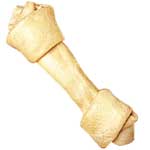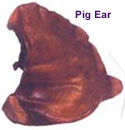Treats - The Good, the Bad and the Ugly
Many treats are safe and sound - the belief is most things in moderation are fine.

Liz Valles, DVM, PA - September/October 2008 True Grit
 As an emergency Vet, I spend so much of my time talking
to clients about treats that they give their dogs and which
ones I feel are appropriate that I thought it would be good to
share my thoughts with you. I won't get into a discussion on diets
and which are good as that is a whole article or series in itself. It
is important to know which treats are safe and why or why not.
Remember, this is my opinion, and while some is based on fact
from experts, most is based on personal experience and what I
see in practice on a daily basis.
As an emergency Vet, I spend so much of my time talking
to clients about treats that they give their dogs and which
ones I feel are appropriate that I thought it would be good to
share my thoughts with you. I won't get into a discussion on diets
and which are good as that is a whole article or series in itself. It
is important to know which treats are safe and why or why not.
Remember, this is my opinion, and while some is based on fact
from experts, most is based on personal experience and what I
see in practice on a daily basis.
Many treats are safe and sound. My belief is most things in moderation are fine. I try to keep people food to a minimum, actually none, at home and only give acceptable treats to our terriers and our one German Shorthaired Pointer, Abby. I advise my clients to feed no people food to their dogs as it so often results in GI disturbances such as vomiting or diarrhea and of course contributes to obesity. I will speak in broad terms excluding reactions to food which would include dogs with food allergies. The dog treats I feel are safe are those which are most like dry dog food, such as Milkbones, of any size, most dry treats that are like a dog biscuit. I have not found the Pedigree brand Denta Bone to be problematic, as dogs tend to eat a bit slowly on those. I am not a proponent of Greenies because they don't seem to break down well in the stomach. I had to do surgery once on a dog that had a gastric (stomach) foreign body. When I opened up the stomach, along with the items to be removed that did show up on Xray were these green rubbery items rectangular in shape that looked like erasers. They were in fact pieces of undigested Greenies eaten in the past 72 hours. I know that they are supposed to be "Veterinarian recommended" so when the "New Improved Greenies" came out I tried one and my dog loved it, but promptly vomited several times the next day. So Greenies are off this vet's list.

I am not a big supporter of rawhides as there can be problems with most of those. The long ones with knots on the ends are dangerous. Dogs tend to get to the very slobbery end. They try to swallow the knot and choke to death. A good friend of mine found one of her best terriers years ago dead from just such a thing. That was enough to keep me from ever giving those again. The bully sticks which are in fact dried bull penis are appealing to dogs but recently at our clinic we had a Bulldog go to surgery to have one removed from his stomach which he swallowed whole !!! Upon retrieving it only 2 inches of one end had even been chewed. The pressed rawhide sticks, which are just small pieces made into a thin stick shape, seem harmless in moderation as they are consumed by most dogs like a biscuit and crumbled and eaten in no time flat. The large rolled rawhides seem fine as they do not unravel and dogs must chew on only the end. These are better for large dogs over 40 pounds. My Shorthair seems safe with these as she works slowly on them. The six inch Pork Twists found often at Wal-Mart or Costco/Sams Club seem fine in moderation too for the same reasons and they do not seem to cause GI upset.
The only rawhides I feel safe with which I have used simply as a final resort because it seems Russells need something to chew on (besides each other) are the flat squares, either basted or plain ones. They come in big bags and I get mine from Wal-Mart or order them from Pet Edge. I have given them for about seven years and have yet to have a problem. We never give them more than one per day and of course not in groups. Dogs tend to fight over treats given that way and can also try to quickly swallow any goodie whole simply to keep the other dogs from getting it, neither of which creates a good outcome. Some of my dogs savor their squares, chewing them slowly, while others have them gone in less than five minutes, but I notice no GI upset or teeth problems from them.
Treats that are soft and chewy are somewhat harmless - again, in moderation. They are those that we often use for training, or in the show ring as bait. Some that come to mind are Pupperonis and Snausages. Even string cheese or hot dogs are OK in small amounts. Most treats that are soft and readily chewable do not create issues unless the dog is very sensitive as I previously mentioned. Now on to my definite NO list - the really evil ones that, especially after this, you will all avoid. The least of the offenders are Nyla Bones - I know they are supposed to be indestructible, but what truly is to a terrier anyway that can chew a hole in a Vari Kennel??? I shy away from Nyla Bones because another Jack Russell friend of mine had to have two surgeries on her dog to remove pieces of, YES, Nyla Bones.
 Next are my last two serious ones - pig ears and hooves.
Please, folks, do not feed these. Yes, agreed the dogs LOVE them,
but pig ears can cause very serious GI distress accompanied by
vomiting and diarrhea and even pancreatitis. Hooves are another
no-no that dogs thoroughly enjoy and, while they do not
cause GI problems, they are teeth breakers. They simply are not
meant to be consumed by dogs. When I took the Small Animal
dentistry short course at WSU from Patricia Frost, DVM and dental
specialist, she was adamant that hooves cause fractures of all
teeth, especially slab fractures of the larger molars, and can result
in tooth root abscesses and need for extraction. I stopped using
them from then on. I have since had many people verify to me
that hooves have caused tooth fractures in their dogs as well as
seeing some in ER practice. Besides, they really smell bad while
the dogs are chewing them, and if you ever step on one in bare
feet, you can't miss it - ouch!! However, for you horse people,
when the horseshoer comes, it is OK for the dogs to chew on the
trimmings as they are soft and come in small slivers that break
apart easily. We can't deny the dogs all the yummy delicacies.
Next are my last two serious ones - pig ears and hooves.
Please, folks, do not feed these. Yes, agreed the dogs LOVE them,
but pig ears can cause very serious GI distress accompanied by
vomiting and diarrhea and even pancreatitis. Hooves are another
no-no that dogs thoroughly enjoy and, while they do not
cause GI problems, they are teeth breakers. They simply are not
meant to be consumed by dogs. When I took the Small Animal
dentistry short course at WSU from Patricia Frost, DVM and dental
specialist, she was adamant that hooves cause fractures of all
teeth, especially slab fractures of the larger molars, and can result
in tooth root abscesses and need for extraction. I stopped using
them from then on. I have since had many people verify to me
that hooves have caused tooth fractures in their dogs as well as
seeing some in ER practice. Besides, they really smell bad while
the dogs are chewing them, and if you ever step on one in bare
feet, you can't miss it - ouch!! However, for you horse people,
when the horseshoer comes, it is OK for the dogs to chew on the
trimmings as they are soft and come in small slivers that break
apart easily. We can't deny the dogs all the yummy delicacies.
While I am sure this is not a comprehensive list, I hope it has shed some light on what treats work and which to stay away from. Again, none of this is scientifically based on clinical trials and I don't want a slander suit from any of the food companies, but it is what I have learned over the years. Many of the products out there create job security for me but I would sooner give good, sound advice for all of our dogs to live by. So remember, all treats in moderation, and try to keep it safe for the love and long life of our dogs.
Article from September/October 2008 True Grit
Interesting in reading other medical articles? If so, please consider joining the JRTCA. As part of your membership you will receive the club magazine, True Grit.